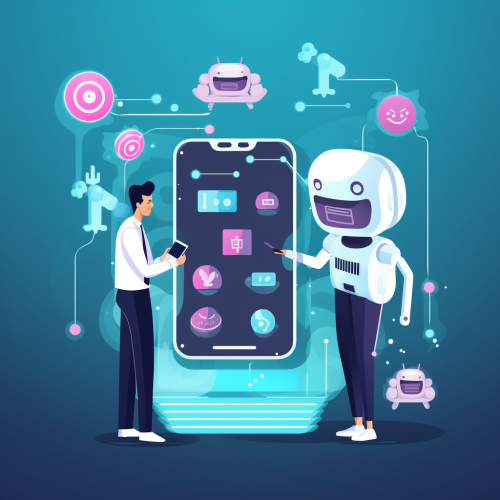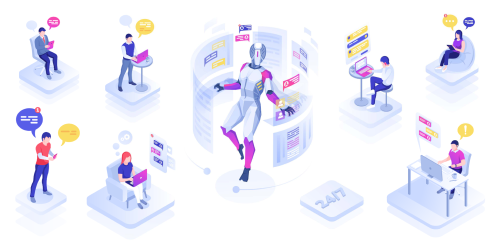Best AI Assistant: The Power of Automation using Virtual Assistant
Introduction
In today's digital era, the integration of artificial intelligence (AI) into our daily personal and professional lives has become increasingly prevalent, with AI virtual assistant apps standing at the forefront of this technological revolution. These AI-powered entities, often referred to as virtual assistants or chatbots, are designed to assist users in performing various tasks, answering queries, and providing personalized recommendations.
Definition of AI Assistant
AI assistant is an intelligent software program that utilizes machine learning algorithms, natural language processing (NLP), and other AI technologies to understand and respond to user inputs in a human-like manner. It refers to smart devices that are capable of performing tasks ranging from simple commands, such as setting reminders or checking the weather, to more complex functions like managing schedules, conducting research, and even engaging in meaningful conversations.
Importance of AI Assistant in Modern Society
The adoption of AI voice assistant has significantly transformed the way individuals interact with technology and access information. AI Virtual Assistant has become indispensable tools in both personal and professional settings, offering convenience, efficiency, and accessibility. In today's fast-paced world, AI-powered virtual assistant empowers users to accomplish tasks more efficiently, stay organized, and make informed decisions in real time.
Overview of the Article's Structure
This article aims to delve deeper into the realm of AI assistant, exploring their various forms and functionalities, as well as their potential impact on society. We will examine three distinct categories of AI assistant: AI virtual assistant, interactive and intelligent virtual human assistant, and personal assistant AI. Each section will provide insights into the characteristics, applications, and future prospects of these AI-driven entities, shedding light on the evolving landscape of human-computer interaction and productivity enhancement.
AI Virtual Assistant
Definition and Characteristics of AI Virtual Assistants
AI virtual assistants are sophisticated software programs that leverage artificial intelligence, natural language processing (NLP), and machine learning algorithms to interact with users and perform complex tasks autonomously. These virtual assistants simulate human-like conversations, understand context, and execute commands to assist users in various activities.
Evolution from Basic Task Automation to Intelligent Conversational Agents
Initially, AI virtual assistants were primarily focused on basic task automation, such as administrative tasks such as setting alarms or sending text messages. However, advancements in AI technology have led to the development of intelligent conversational agents capable of understanding complex queries, providing personalized recommendations, and adapting to user preferences over time.
Examples of Popular AI Virtual Assistants
Some of the most well-known AI virtual assistants include Siri (Apple), Alexa (Amazon), and Google Assistant (Google). These virtual assistants are integrated into smartphones, smart speakers, and other IoT devices, enabling users to access information, control smart home devices, and perform various tasks through voice commands or text inputs.
Applications in Various Domains
AI virtual assistants find applications across diverse domains, including:
Smart Home Devices: Controlling lights, thermostats, and other connected devices.
Customer Service: Providing automated support and assistance through chatbots on websites and messaging platforms.
Productivity Tools: Scheduling appointments, setting reminders, and managing to-do lists.
Entertainment: Recommending movies, music, and other forms of entertainment based on user preferences.
Advantages and Challenges of AI Virtual Assistants
Advantages:
Convenience: Users can access information and perform tasks hands-free using voice commands.
Efficiency: AI virtual assistants automate repetitive tasks, saving time and effort.
Personalization: Virtual assistants can tailor responses and recommendations based on user preferences and past interactions.
Challenges:
Accuracy: Understanding natural language and context accurately can be challenging for AI virtual assistants, leading to misunderstandings or incorrect responses.
Privacy Concerns: Users may have concerns about data privacy and security when interacting with AI virtual assistants, especially regarding the collection and use of personal information.
Integration Complexity: Integrating virtual assistants into existing systems and platforms may require technical expertise and resources, posing challenges for some organizations.
In customer service applications, AI virtual assistants provide round-the-clock support, take phone calls, answer frequently asked questions, and assist users in resolving issues efficiently, thereby enhancing customer satisfaction and reducing support costs for businesses.
Interactive Virtual Assistant
Explanation of Interactive Virtual Assistants and Their Capabilities
Interactive virtual assistants represent a new frontier in AI technology, offering enhanced engagement, voice interaction, and interactivity beyond traditional AI virtual assistants. These assistants are designed to interact with users in a more dynamic and immersive manner, leveraging advanced technologies such as augmented reality (AR), virtual reality (VR), and natural language understanding to create compelling user experiences.
Comparison with Traditional AI Virtual Assistants
While traditional AI virtual assistants primarily focus on task automation and information retrieval, interactive virtual assistants take user interaction to the next level. They engage users through conversational interfaces, personalized recommendations, and interactive experiences, fostering deeper connections and driving higher levels of engagement.
Use Cases in Gaming, Education, Healthcare, and Entertainment
Interactive virtual assistants have diverse applications across various industries:
Gaming: Virtual assistants can serve as in-game companions, providing guidance, hints, and interactive storytelling experiences to enhance gameplay.
Education: Virtual tutors and learning companions can offer personalized learning experiences, adapt to individual learning styles, and provide real-time feedback to students.
Healthcare: Virtual health assistants can assist patients with medication reminders, symptom tracking, and accessing health information, improving patient engagement and adherence to treatment plans.
Entertainment: Interactive storytelling experiences, virtual tours, and immersive entertainment applications leverage virtual assistants to enhance user engagement and entertainment value.
Emerging Trends in Interactive Virtual Assistant Technology
Several trends are shaping the development of advanced AI technologies for interactive virtual assistants:
Multi-Modal Interaction: Virtual assistants are evolving to support multiple modes of interaction, including voice, gestures, and touch, to accommodate diverse user preferences and scenarios.
Emotional Intelligence: Virtual assistants are equipped with emotional intelligence capabilities to recognize and respond to user emotions, enhancing the quality of interactions and user experiences.
Personalization: Virtual assistants are becoming more personalized, leveraging user data and preferences to tailor recommendations and interactions to individual users.
Integration with AR/VR: Virtual assistants are increasingly integrated with AR and VR technologies to create immersive and interactive experiences, blurring the lines between the physical and virtual worlds.
Potential Impact on User Engagement and Immersion
Interactive virtual assistants have the potential to revolutionize user engagement and immersion across various domains. By providing personalized, interactive experiences that adapt to user preferences and behaviors, these assistants can foster deeper connections between users and digital experiences, driving increased engagement, satisfaction, and loyalty. As interactive virtual assistant technology continues to evolve, it holds promise for transforming the way we interact with technology, learn, entertain ourselves, and engage with the world around us.
Personal Assistant AI

Concept of Personal Assistant AI and Its Role in Personal Productivity
Personal Assistant AI refers to intelligent software designed to assist individuals with various tasks, organization, project management, and information management in their personal lives. These AI-driven personal assistants aim to enhance personal productivity by automating routine tasks, providing timely reminders, and offering personalized recommendations to users.
Features and Functionalities of Personal Assistant AI
Personal Assistant AI typically offers a range of features and functionalities, including:
Task Management: Creating, organizing, and prioritizing tasks and to-do lists.
Calendar Integration: Scheduling appointments, setting reminders, and managing events.
Email Management: Sorting, categorizing, and responding to emails.
Information Retrieval: Providing answers to questions, accessing relevant information, and conducting web searches.
Smart Recommendations: Offering personalized suggestions for activities, events, and purchases based on user preferences and past behavior.
Integration with Calendars, Email, Task Management Tools, etc.
Personal Assistant AI seamlessly integrates with various digital tools and platforms commonly used for personal organization and communication. This includes integration with:
Calendars: Syncing with calendar apps such as Google Calendar, Outlook, and Apple Calendar to manage appointments and events.
Email Platforms: Integrating with email clients like Gmail and Outlook to manage emails, schedule responses, and categorize messages.
Task Management Tools: Connecting with task management apps such as Todoist, Trello, and Microsoft To Do to synchronize tasks and to-do lists.
Smart Home Devices: Integrating with smart home devices like Amazon Echo and Google Home to control connected devices and access personalized information through voice commands.
Customization Options and Adaptability to User Preferences
Personal Assistant AI offers customization options to adapt to individual user preferences and workflows. Users can personalize settings such as:
Preferred Communication Channels: Choosing between voice commands, text inputs, or both for interacting with the assistant.
Notification Preferences: Adjusting the frequency and format of notifications for reminders, updates, and recommendations.
Language and Tone: Selecting the language, tone, and style of interactions with the assistant to suit personal preferences.
Benefits for Time Management, Organization, and Efficiency
Personal Assistant AI provides several benefits for time management, organization, and efficiency in all your tasks, text and speech recognition including:
Streamlined Workflow: Automating routine tasks and centralizing information management to reduce cognitive load and improve focus.
Improved Productivity: Assisting users in prioritizing tasks, managing schedules, and staying organized to accomplish goals more effectively.
Enhanced Decision-Making: Providing timely reminders, relevant information, and personalized recommendations to support informed decision-making.
Time Savings: Automating manual processes and providing quick access to information to save time and increase overall efficiency in daily activities and tasks.
Overall, Personal Assistant AI serves as a valuable tool for individuals seeking to optimize personal productivity, manage information overload, do personal tasks, and achieve a better work-life balance in today's fast-paced digital world.
The Future of AI Assistants
Current Trends Shaping the Future of AI Assistants
AI assistants are poised for significant advancements in the coming years, driven by several key trends:
Conversational AI: AI assistants will become even more adept at natural language understanding and generation, enabling more human-like interactions and personalized experiences.
Multi-Modal Interfaces: AI assistants will support multiple modes of interaction, including voice, text, gestures, and touch, to accommodate diverse user preferences and scenarios.
Contextual Awareness: AI assistants will leverage contextual information, user history, and environmental cues to provide more relevant and timely assistance.
Integration with Ecosystems: AI assistants will seamlessly integrate with IoT devices, smart home environments, and digital ecosystems to deliver connected and cohesive experiences across devices and platforms.
Advancements in Natural Language Processing (NLP) and Machine Learning (ML)

Advancements in NLP and ML technologies will drive significant improvements in AI assistant capabilities:
Language Understanding: NLP algorithms will better understand nuances in language, context, and intent, enabling more accurate and contextually relevant responses.
Personalization: ML models will leverage user data to personalize interactions, recommendations, and responses, enhancing user satisfaction and engagement.
Continuous Learning: AI assistants will employ lifelong learning techniques to adapt and improve over time, refining their capabilities based on user feedback and evolving user needs.
Integration with IoT Devices and Smart Environments
AI assistants will play a central role in the growing ecosystem of voice assistants, android devices, IoT devices, and controlling smart home devices and environments:
Home Automation: AI assistants will control and coordinate IoT devices in the home, orchestrating tasks such as adjusting lighting, temperature, and security systems based on user preferences and routines.
Health and Wellness: AI assistants will monitor and manage health-related IoT devices and sensors, providing personalized recommendations and assistance for wellness and healthcare management.
Workplace Integration: AI assistants will integrate with smart office environments, coordinating tasks, scheduling meetings, and facilitating collaboration among employees.
Potential Impact on Workforce Productivity and Job Roles
The widespread adoption of AI assistants will have profound implications for workforce productivity and job roles:
Automation of Routine Tasks: AI assistants will automate repetitive tasks, freeing up human workers to focus on higher-value activities that require creativity, critical thinking, and emotional intelligence.
Augmented Intelligence: AI assistants will augment human capabilities, providing real-time insights, recommendations, and support to enhance decision-making and problem-solving across various industries and job roles.
Reskilling and Adaptation: As AI assistants become more prevalent, workers may need to acquire new skills and adapt to changing roles and responsibilities to effectively collaborate with AI systems and leverage their capabilities.
Ethical Considerations and Concerns Regarding AI Assistant Development
The development and deployment of AI assistants raise important ethical considerations and concerns:
Privacy and Data Security: AI assistants collect and process vast amounts of personal data, raising concerns about privacy, data security, and the responsible use of user information.
Bias and Fairness: AI assistants may exhibit biases in their recommendations and decisions, reflecting underlying biases in training data or algorithmic biases, which could perpetuate inequality and discrimination.
Transparency and Accountability: AI assistants should be transparent about their capabilities, limitations, and decision-making processes to ensure users understand and trust the technology. Additionally, mechanisms for accountability and recourse should be in place to address errors, biases, and misuse of AI assistants.
As AI assistants continue to evolve and become increasingly integrated into our lives and workplaces, it is essential to consider these ethical considerations and engage in ongoing dialogue and collaboration to ensure that AI technologies serve the best interests of society as a whole.
Conclusion
In conclusion, AI assistants represent a transformative force in the digital landscape, offering unparalleled convenience, efficiency, and personalized assistance across various domains. Throughout this article, we have explored the diverse categories of AI assistants, including AI virtual assistants, interactive virtual assistants, AI-powered virtual assistants, assistant apps personal assistant AI, and AI tools, each with unique capabilities and applications.
We have discussed how AI virtual assistants streamline tasks, interactive virtual assistants elevate engagement, and personal assistant AI enhances personal productivity. These AI-driven technologies are continually evolving, fueled by advancements in natural language processing capabilities, machine learning, and integration with IoT devices and smart environments.
As we look to the future, the potential of AI and AI virtual assistants designed assistants to revolutionize human-computer interaction and reshape industries is undeniable. However, with this transformative power comes a responsibility to embrace AI and digital assistant technology responsibly. It is crucial to address ethical considerations surrounding privacy, bias, transparency, and accountability to ensure that AI and digital assistants serve the best interests of users and society.
In closing, the future of AI assistants is bright and full of exciting prospects. By harnessing the capabilities of AI technology and embracing responsible innovation, we can unlock new opportunities for productivity, creativity, and collaboration, ultimately enhancing the quality of life for individuals and communities worldwide. Let us embrace the journey ahead with optimism and a commitment to shaping a future where AI assistants enrich our lives in meaningful and empowering ways.





